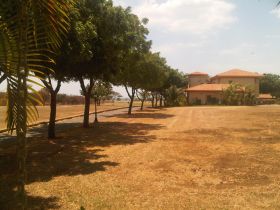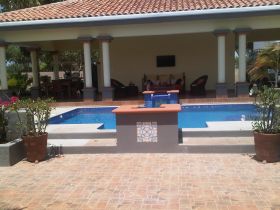A New Twist on Life in Nicaragua
Jet Metier first heard of the term “tail twisting” from Kent Payne, who explained that it’s a way to get a cow to move where it should go by twisting its tail. Kent expounded that the same principle could be applied to people. Jet learns it did not take much tail twisting for Kent and his wife to settle down in beautiful Gran Pacifica, Nicaragua.

Jet Metier: Good morning, Kent! This interview is our way on behalf of our visitors to thank you for all your contributions to the site and to satisfy our curiosity about your life in Nicaragua, especially after reading your stories. Do you have any other fascinating stories that are top of mind that you would like to share with us?
Kent Payne: When I have a new story, I usually write it for submission. Other than that, all I've ever done is work these past few weeks. You've read the only interesting things I've done, other than lose 200 Cordoba (about US $8) at a poker game last night.
Jet Metier: What I get from your stories is that you are a “man's man.” The big game fishing, the cigars, the fascination with oxen working better than 4X4's. So tell us what about Nicaragua encourages your sense of adventure? I see you as very Hemmingway-esque.
Kent Payne: Someone asked Sir Edmund Hilary, “Why did you climb Mt. Everest?” His answer, "Because it was there."
I knew in the 8th grade studying high school Spanish that I wanted to retire where someone named Maria took care of the house, and Juan was the gardener. Only here, we have Julia and Yerris.
Jet Metier: You grew up in Oklahoma, right? And earlier you taught us about the term “tail twisting” that they use there. Tell me what kind of skills you developed as a rough living boy in Oklahoma that you had to use when adapting to life in Nicaragua.
Kent Payne: You make it sound like I grew up chewing on grass stems, and saying "Aw, shucks."
Nothing further from the truth, in some ways. I grew up with my dad in the oil patch, so we were transferred constantly (14 grade schools in six years). Pretty mobile. But I spent every summer at my granddad's farm, where we raised Hereford cattle, bush hogged, hauled hay, and did lots of other things that are done around here in Nicaragua.
Jet Metier: What is an "oil patch" and what did your dad do? Did you ever consider doing the same thing as your dad?
Kent Payne: Short answers. Dad worked for Schlumberger as an engineer/down hole logger (too complicated to explain….they took “radar” photos of formations down a well hole to see where the oil was.) I never wanted to go into that business, though my little brother and dad started their own company about the time bro got out of college.
Jet Metier: When you moved to a new school, how did you handle being the new boy and get accepted into the group?
Kent Payne: I got my butt kicked a couple of times, once because I wore socks that matched the color of my shirt on my first day in school. Found out that if you did not wear white socks, Levi's 501's and penny loafers, you were a target. My red socks and red paisley shirt were like waving a cape in front of the bulls. A “greaser,” older than I, stepped up and stopped the encounter before it became blatant carnage.
After the eighth grade, we settled in one town, I started playing rock and roll in a garage band, only got arrested once, and got a fairly comprehensive education (big words for an Okie) at the University of Oklahoma.
Grew up in a company that had lots of Mexican management at my level, and they adopted me even though I was a “gringo.” They told me if I got a better suntan, and a green card, they could take me anywhere in Mexico I wanted to go. Since I spoke Spanish, they called me primo blanco, or white cousin.
Jet Metier: What instrument did you play? Did you play cover or original songs? And what songs do you rock out to the best? And is there a night when the ex-pat community can see you perform with other rock and rollers?
Kent Payne: I played bass guitar, only because our real bassist was a REAL musician, and could play horns, sitar, and keyboards. So I could only understand one note at a time. Cover, mostly Beatles, Dave Clark Five, and James Brown, just to mention a few. I am a dyed in the wool Beatles and Eagles fan, Van Morrison too, since he's a frustrated jazz artist who just happens to be a rocker.
Unfortunately, there are not many rock guitarists locally. Found one last week, and he was talking about Styx and Poison. I thought he'd found a tree that would kill you if you chewed on it.
Jet Metier: I look forward to the day when you write us that you got Glen Fry to play down at Gran Pacifica and he asked you to sit in.
Because I have grandparents who worked the land I am fascinated by that, so like to ask you to compare ranching life in Oklahoma compared with ranching live in Nicaragua.
Kent Payne: I have a buddy here from Houston (he is the one that took my $8 last night), who raises Brahma cattle here for beef production. Since we get rain only six months of the year, he has to put up enough "bull grass" to feed his herd, and have some left over to sell to other producers. In some ways, it is a supply and demand business according to him.
I'm really removed from any agribusiness, since I sell investment, vacation and retirement real estate. My farming experience here has to do with bananas grown in the yard next door (we are allowed to steal them if the neighbors are not here), mangos, papaya, and coconuts growing everywhere.
Locals have their pigs and chickens, but they are not allowed inside the gates of our community, as you might imagine. Not that we're really snobs, but having pig dung all over the lot next door does not allow for higher investment prices.
People in the big town of Managua also have chickens…..you haven't lived until the 18 roosters around you start crowing at 4:00 AM, the windows are open and the chickens are loud.
Jet Metier: You mentioned you work all the time. What is the view like from your office window and when you go out on your lunch break, what astounds you and reminds you that amazingly you are living in tropical Nicaragua?
Kent Payne: Check your email in a minute.

Jet Metier: Oh, golly! Is that yours?
Kent Payne: The photos show our back yard with a nice home that we could not have afforded in the states. Only thing we have to be careful of here is power bills.
The other shows our neighbor’s house, with the banana trees. We overlook the golf course, down to the ocean about 600 meters away.
Jet Metier: Those notorious bananas! Let's give our visitors an example by contrasting life for someone retiring near the University of Oklahoma as opposed to retiring in Gran Pacifica. What they would have for a house, the neighborhood, and how much discretionary income they would have left over? Then tell us more about what houses are like at Gran Pacifica, the grounds (sans roosters that are not there), and the money they could use for recreation to blow past losing $8 at poker to a transplanted Houston cattleman.
Kent Payne: Norman, Oklahoma is a nice place to own a home, and close to OKC. Someone living there would have a home about the same size as mine here (about 2,400 sq. ft.) for about $125/sq. ft., with stick build (2x4) construction. If you follow the news, you know that in the last 10 years this part of Oklahoma has had three killer tornadoes, and construction does not survive an F5.
Here, all homes are concrete and steel (like a commercial building) and are built to California seismic specifications, allowing for structural integrity for earth movement. I qualify earth movement, because the dry/wet environment allows the soil to expand and contract, with tremendous stress on the house.
So, you build to withstand earthquakes (a magnitude 6.6 about 2 months ago), and get fewer problems than in most parts of Southern California. And these homes can be constructed for about $85/sq. ft., plus the cost of the lot.
We plan to retire on about $3,500 / month (our combined social security) and travel with any dividends from other investments. Not bad.
As to the grounds at Gran Pacifica, not any of our home sites are over 650 meters from the beach, and we installed old Chicago-style brick sidewalks.
Jet Metier: Tell me about the infrastructure and the amenities of Gran Pacifica that would add ease and peace of mind to someone considering a part-time vacation home or retirement residence.
Kent Payne: Short answers. Underground utilities, including power, internet/TV fiber optics, potable water, city sewers, and storm drains. Yes, storm drains….unheard of in Central America where torrential rains can rise four or five feet in an hour. We provided all of this before the first homes were but a dream. 24/7 security guards, a Nicaraguan feel for architecture, but with North American construction standards. We even require our builders to provide, in writing, a one-year's warranty on construction… again, unheard of in Central America.
We offer RIGHT NOW, golf, horses, two world class surf points, boogie boards, beach combing, art classes, and yoga. We have weddings here every month, and lots of people day trip on the weekends.
The Wyndham Hotel is under construction, and we have a newly graded road (six miles) under construction for paving with cobblestone…it will be ready late in 2015.
Jet Metier: It sounds like camp for adults. Wonderful. How about more for the future? What is on the drawing boards? And what makes Gran Pacifica better and different than other resort-style communities in Nicaragua?
Kent Payne: With 2,500 acres, and we've just built the first 55 acres, we hope to provide over the next 25 years an entire town. Takes time, but if we follow the business plan, we anticipate much growth (construction and economic) over the next few years. There are plans for an expanded golf course, and lots of other activities. We built Gran Pacifica not only because we wanted to sell it to the world, but live here ourselves. In short, we put our money where our mouth (heart, life) is.
Julia is telling me lunch is on the table here.
Jet Metier: I don't want to keep you from lunch, so can you tell us how your wife’s life has improved since moving to Gran Pacifica, and although you work all the time, what its like for her personally living in a resort.
Kent Payne: The wife got to quit a high-pressure mortgage company job, has a maid and gardener, built a pool to relax by, and we live on about 30% of what we needed in the States. We live in shorts and t-shirts, and don't need expensive business wear for meetings. Not bad.
And when the other social security kicks in, we can both live without working. Expenses are about $2,000 / month, and we're not cutting anything out.
Jet Metier: Thank-you so much Kent. I appreciate your time with me in and I shall remember you as imitable and funny.


